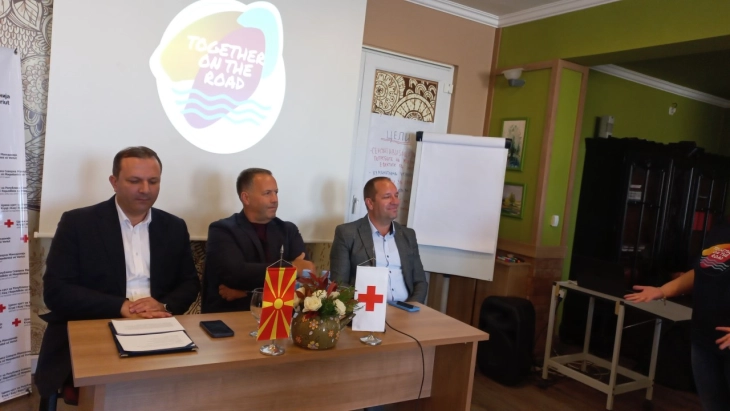Spasovski: Migration – a global challenge, multidisciplinary approach and common policies necessary

Struga, 4 October 2022 (MIA) – Migration is one of the global challenges that will remain present in the future, which is why it is important for all countries to have a multidisciplinary approach and common policies on this issue, said Minister of the Interior, Oliver Spasovski on Tuesday in Struga, while addressing the participants in the regional program on migration - Humanitarian Aspect of Mixed Migration Flows, organized by the Red Cross of North Macedonia.
The event was attended by 45 young people from North Macedonia, Montenegro and Serbia, who had the chance to exchange experiences and information, and upgrade their knowledge on dealing with migrations.
“As a country we have progressed a lot in terms of our readiness to deal with the consequences of migration compared to 2015. This is true for all the countries in the EU and the region as well. We are fully compliant with the EU’s migration policies, we have common policies with the countries of the region, because this is the only way to handle the issue successfully,” said Spasovski.
Migration as a phenomenon, he pointed out, is something that will remain an issue in the future and will affect various aspects, including security, the humane approach towards the people seeking protection and the economic aspect.
“The most important aspect for us, of course, is to maintain security and stability for our citizens, for our country and to help the people seeking protection. It is especially important to mention that we are practically dealing with the consequences of migration. We are not solving the issue of migration, because migration has to be solved at its source, where the conditions which push people to seek refuge in a different place have been created,” said Spasovski.
North Macedonia, he underscored, is entirely compliant with European policies.
“The key goal of the country and the Ministry of the Interior is made up of two aspects. The first is to have a humane approach, respecting all human rights and on the other hand, to look after the security of our own citizens and country. That balance has to be maintained and this is where close cooperation comes into play,” added the Minister, underlining that no one knows when and for what reasons a crisis may occur that will cause new waves of migration to appear.
Red Cross Secretary General Sait Saiti said he believes that with this event they will contribute to building more adequate future responses to the challenges caused by migration.
“We live in a turbulent world and, as responsible organizations and individuals, we must prepare to contribute to the solving of these universal civilizational issues, especially the aspect tied to our operations – the humanitarian aspect,” said Saiti.
The Dean of the Faculty of Security, Nikola Dujovski, believes that migrations are one of the more positive social trends.
“This is how humanity develops. Ever since ancient times, every continent in the world has advanced thanks to migration, and we have to look at migrations as a very positive thing. Today, also, we have a very positive wave of migration in the world. Maybe we complain because of the brain-drain, but the young people, who can find a way, move to Western Europe, which is facing the same issue. The prestigious professions there are moving to the United States…” said Dujovski.
The program on migration “Humanitarian Aspect of Mixed Migration Flows” will provide the participants with a theoretical and real presentation of the complexity of migrant crises and flows. The program is supported and financed by the Swiss Red Cross, the Swiss Agency for Development and Cooperation and the International Federation of Red Cross and Red Crescent Societies. ad/ik/







